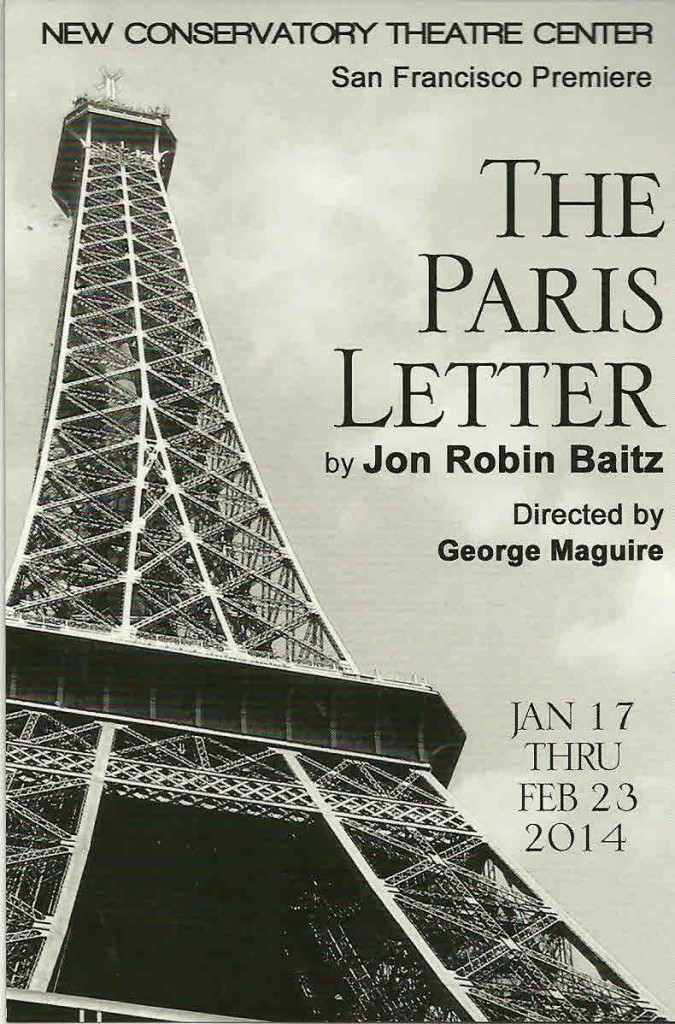THE PARIS LETTER: Drama by Jon Robin Baitz. Directed by George Maguire. New Conservatory Theatre Center (NCTC), Walker Theatre, 25 Van Ness @Market, San Francisco, CA. 415-861-8972 or www.ntcsf.org. Through February 23, 2014.
THE PARIS LETTER effective and affective staging at NCTC. [rating: 4] (5/5 stars)
When George Maguire helms a theatrical production it is assurance that the audience is in for a theatrical experience. So it is with the Bay Area premiere of The Paris Letter. Considering that the play is non-linear, covers 40 years of relationships, the cast with one exception play dual roles and there is a narrator such an undertaking deserves and earns accolades. The original three hour play that opened in Los Angelos in 2004 was pared to two hours for the 2005 off Broadway opening and this latter version is playing on NCTC’s intimate Walker Theatre.
Author Jon Robin Baitz is no stranger to the Bay area. His tightly written play Other Desert Cities that received a nomination for the Tony Award and won the Outer Critics circle Award in 2011 received a striking production last year at TheatreWorks. The Paris Letter written much earlier in his career and is said to be semi-autobiographical tends to ramble and requires the audience to pay close attention to fully appreciate the time line and some of the nuanced details.
Maguire cleverly separates the time shifts and allows the scenes to flow with minimal interruption by creating a charming set (Devin Kasper) framed by red velvet drapes and gilt framed shadow boxes containing props with a huge circular central backlit scrim that is also used for projections (Lighting/projections by Christian Meja). Those projections are integrated into the story and there is no doubt that a scene takes place in winter when snow gently falls.
But in the words of William Shakespeare, “The plays the thing” ( Hamlet Act 2, Scene 2) and Baitz begins with a stunning first volatile first scene between an older Sandy Sonneberg (Ron Dritz) and his younger paramour Burt (David Ewing) that ends with a suicide taking place behind the circular scrim with a projection of the Eiffel Tower. Blackout and the aforementioned narrator an older wiser and fey Anton (a superb Tom Reilly) steps forward, addresses the audience informing us he is going to tell us the story behind that scene and what is in a letter from Paris that he is holding then secrets in his jacket pocket. The contents of that letter are not revealed until late in the play.
The play is a convoluted love story wrapped in the problematic history of gay acceptance from the 1960s to the present tracing the journey of a successful investment advisor who is closeted gay man denying his sexuality and attempting to be ‘cured’ of his affliction. The man in question is young recent Princeton graduate Sandy (Paul Collins) whom is befriended by young Anton (David Ewing) who is living comfortably with his homosexuality. Anton introduces Sandy to the hidden gay world, appreciation of art, theatre and enjoyment of accepting ones nature. Sandy thoroughly enjoys the sexual experience, insists “I am not a homosexual” but confesses to love of Anton. That love eventually becomes oppressive leading to catastrophic results in later years.
After a few months of this new hedonistic experience with young Anton (handsome David Ewing) Sandy visits Dr. Schiffman (Ron Dritz in his second role), a misinformed psychiatrist claiming to have the ability to change same sex attraction in men to a more conventional life style. This is the start of five day a week therapy (“And if you miss a day, you still have to pay!”) that continues for 15 years.
Baitz then solidifies his play scene by scene adding characters that define the time frame of the play and attitudes of each individual. Early on there is a charming scene between Sandy’s mother Lillian (Michaela Greeley) young Sandy and young Anton taking place in a gay oriented restaurant. The interchange between the three is delicious and Greeley gives a beautifully nuanced portrayal of a mother who knows her son is gay and secretly is accepting of it.
Sandy, to complete his conversion to heterosexuality, falls in love with Katie (Greeley again) who has a gay son Sam (Collins) and through clever sub-rosa dialog infers that she is fully aware of Sandy’s proclivities. Herein lays a perceived flaw in this the production. Although there is a plethora of physical contact between Greeley and Dritz the charisma signifying love is not generated.
Through the years Sandy and Anton have remained friends with Anton as father confessor and Sandy insisting he is ‘love’ with Anton and Katie. Sandy uses the friendship/love of Anton to keep Anton near and available for selfish reasons. There is a secondary contemporary plot line involving Burt in a Ponzi type scheme that eventually leads to the suicide in scene one. Be advised to watch and listen closely to the dialog and action in the penultimate scene of the play that is a shocker. You will never hear a more satisfying and meaningful “I TOLD YOU SO!” Maguire’s spot on direction does great justice to Baitz’s convoluted play.
Running time 2 hours 10 minutes including the intermission.
Courtesy of www.theatreworlintermagazine.com.
Cast: Paul Collins as Sam/Young Sandy; Ron Dritz as Sandy/Schiffman; David Ewing as Burt/Young Anton; Michaela Greeley as Katie/Lillian; Tom Reilly as Anton.
Production Staff: David Kasper (Set Design); Billie Cox (Sound Design); Christian Mejia (Lighting/Projection Design); Rebecca Madsen (Properties); Samantha Young (Stage Manager); Miriam Lewis (Costume Design); Lori Fowler (Casting Director); Ed Halvey (Program Design).



